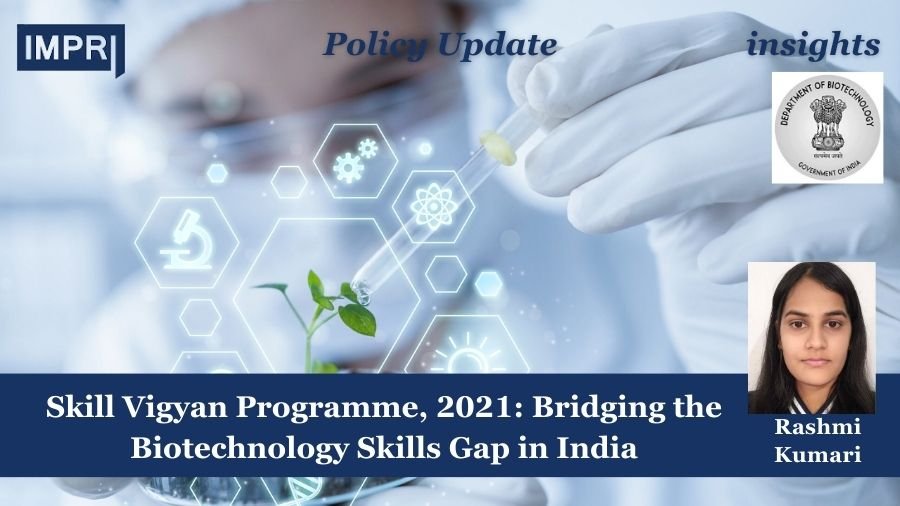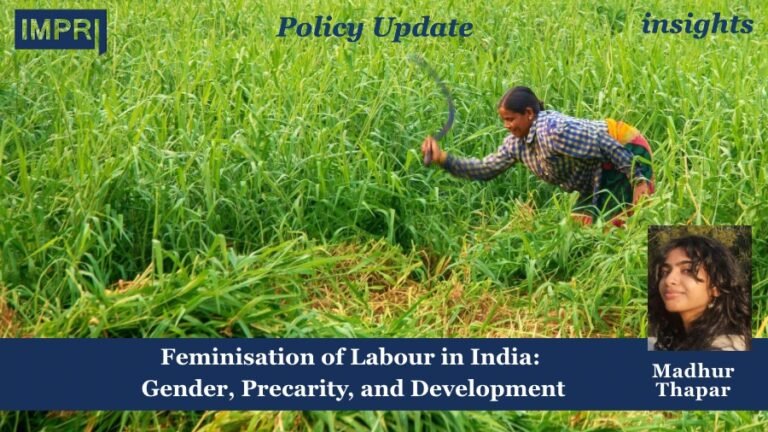Policy Update
Rashmi Kumari
Introduction
The Skill Vigyan Programme, formally known as the Skill Development Programme in Biotechnology, is a national initiative launched by the Department of Biotechnology (DBT), Ministry of Science & Technology, Government of India. The DBT Skill Vigyan Programme was officially launched on 25th February 2021, coinciding with the celebration of National Science Day. It aims to create a skilled workforce in biotechnology and life sciences by providing industry-aligned, hands‑on training in emerging and applied techniques. Through training across multiple categories, which include students, technicians, faculty, entrepreneurs, and finishing schools, it targets various levels of the biotechnology education ecosystem.
Functioning & Implementation Model
State‑Partnership and Hub‑and‑Spoke Model
The programme is implemented via State Science & Technology Councils across multiple states under a hub‑and‑spoke framework. These Councils partner with academic and research institutions to establish Skill Vigyan Centres, which serve as training hubs. Initially, the programme was rolled out in six states: Arunachal Pradesh, Himachal Pradesh, Meghalaya, Odisha, Punjab, and Uttarakhand, and later expanded to include Karnataka, Telangana, and Andhra Pradesh.
Five Training Streams
DBT supports implementation across five distinct streams:
- Student Training
- Technician Training
- Faculty or Refresher Training
- Entrepreneurship Training
- Biotechnology Finishing School Programme
Training durations typically range from 3 to 6 months, with a standardised curriculum aligned with National Skills Qualification Framework (NSQF)-approved sector skill councils, such as LSSSDC, ASCI, FICSI, and HSSC. State Councils’ affiliate partner institutes facilitate the “Train‑the‑Trainer” modules and ensure certification of participants under national qualifications.
Stipend and Selection
Participants are selected based on merit or state-level entrance examinations. Trainees receive monthly studentship stipends (₹3,000-₹5,000 per month for 3 months) during the training period, varying by region and learner category. For example, in Himachal Pradesh, B.Sc. Biotechnology graduates in the Quality Control Biologist stream receive ₹5,000 per month, while institutes like HPU offer ₹10,000 per month to M.Sc./B.Sc.Tech trainees.
Training Partners and Locations (Example)
- Himachal Pradesh (HIMCOSTE) partners with CSIR‑IHBT, ICAR‑CPRI, HPU Shimla, Shoolini University, Eternal University, and others, hosting specific training modules with multiple institutions each offering limited seats per semester.
- Kerala (KSCSTE/KBC) runs programmes across about 15 institutions, offering both student and technician training (approximately 400 seats annually), with stipulated stipends and certification aligned to QPs by LSSSDC, ASCI, FICSI, and HSSC.
Performance & Impact
Skill Development and Employment Readiness
The programme is designed to bridge academia and industry gaps by teaching industry-relevant skills, such as quality‑control microbiology, lab operations, bioprocess technology, genetic counselling, plant tissue culture, etc. These courses help trainees become job-ready for placements in pharmaceutical, FMCG, agricultural biotech, diagnostic, and clinical research labs.
Scale and Reach
While detailed national aggregate data is not in the public domain, thousands of students across multiple states have been certified through State‑partnered institutions annually. For instance, Kerala alone trains around 400 trainees per year, Himachal engages 200 to 250 trainees per year across categories, Uttarakhand, Gujarat, and others similarly contribute.
Enhanced Faculty Capacity
Faculty training programmes in states like Kerala train approximately 260 faculty members per year in advanced techniques such as LC‑MS, molecular cloning, neurobiology, cell culture, aromatic plant GC, thus up‑skilling academic staff and researchers for modern biosciences education.
Promotion of Entrepreneurship
Through entrepreneurship training and finishing schools (such as agritech entrepreneurship in Karnataka), the programme promotes an innovation mindset, helping trainees identify viable biotech startups and navigate incubation or CM startup schemes.
Achievements
- Multi-state footprint: Now active in at least nine states, with partnerships across a diverse set of institutions.
- Institutional network: Over 20 top academic and research institutions are part of the Skill Vigyan network, including 15 in Kerala, 8 in Himachal Pradesh, and 5 in Uttarakhand, pooling expertise to deliver impactful training.
- Certification under NSQF: Every course is aligned and certified via the National Skill Councils, ensuring standardisation and industry acceptance.
- Stipend‑based training: Trainees receive studentship stipends during training, which makes it accessible to economically diverse participants.
- Impact on placements: Many trainees have found placements in industries, hospitals, diagnostic labs, food and pharmaceutical companies, and some have ventured into entrepreneurship.
- Faculty upskilling: Hundreds of faculty trained annually in frontier areas, boosting teaching standards and research preparedness (e.g., Kerala’s 260 faculty per year).
Challenges
- Limited geographic reach: The programme initially covered only six states; extension to the remaining states is still underway.
- Data transparency: National-level consolidated statistics on total trainees, placement success rates, and gender balance are not publicly available.
- Resource constraints: Partner institutions often face limitations in lab infrastructure or capacity to scale training beyond existing intake.
- Industry absorption: Placement depends on local industrial presence; states with fewer biotech companies may face challenges finding suitable job connections.
- Sustainability: Ensuring continuity beyond the stipulated 3 to 5-year project funding cycles requires institutional ownership and policy backing.
Way Forward
- National Scale-Up: Extend the programme to all Indian states and union territories, especially those with growing biotech hubs, to create pan-India access. DBT could partner with additional State Councils or universities in emerging biotech clusters.
- Data & Monitoring Framework-Institute a centralised monitoring and evaluation system, publishing annual dashboards that track enrolment, completion rates, placement outcomes, gender diversity, stipend utilisation, and feedback.
- Infrastructure Development-Provide recurring grants or public‑private partnerships to upgrade labs, expand intake slots, and enhance training facilities in partnering institutions.
- Stronger Industry Linkages-Forge MoUs with biotech firms, hospitals, pharma units, dairy/food companies, and diagnostics labs in each state for guaranteed internships, apprenticeships, and placement pipelines. Enable regional placement cells within Skill Vigyan Centres.
- Diversify Training Streams-Include emerging domains such as synthetic biology, AI‑enabled bioinformatics, precision fermentation, molecular diagnostics for infectious diseases, vaccine analytics, and regulatory‑compliance workflows.
- Entrepreneurship and Incubation-Scale-up incubation support and mentorship for trainees with startup ideas. Coordinate with state startup schemes and innovation funds (e.g., CM Start‑up schemes) to nurture biotech entrepreneurs.
- Faculty Sustainability-Regular faculty training modules, refresher courses, e‑learning access, and collaborative workshops should be institutionalised so that faculty keep pace with rapid advancements.
- Inclusivity & Outreach-Encourage more female, rural, and socio‑economically disadvantaged students to apply through reservation, scholarship, and travel support. Promote awareness in high schools and colleges across underrepresented regions.
Conclusion
The DBT Skill Vigyan Programme represents an important step forward in India’s mission to build a biotechnology workforce that is industry-ready, certified, and globally competitive. By combining hands‑on training, stipend support, faculty up‑skilling, entrepreneurship, and sector-oriented curricula, it addresses a critical skills gap. While its achievements in multiple states and institutions are laudable, future success depends upon broader scale-up, stronger monitoring, enhanced infrastructure, deep industry linkages, and sustained funding strategies.
With expansion into more states and streamlined execution, the Skill Vigyan Programme has real potential to transform the biotech learning ecosystem in India and contribute significantly to national goals such as Make in India, Atmanirbhar Bharat, and the evolving biotech economy.
References
- Department of Biotechnology. (n.d.). Skill Vigyan Programme: Skill development programme in biotechnology. Ministry of Science & Technology, Government of India. Retrieved August 8, 2025, from https://dbtindia.gov.in/skill-vigyan-programme-skill-development-programme-biotechnology
- Himachal Pradesh Council for Science, Technology and Environment. (n.d.). About the Skill Vigyan Program. Retrieved August 8, 2025, from https://himcoste.hp.gov.in/RnD_Website/pdf/About%20the%20Skill%20Vigyan%20Program.pdf
- Uttarakhand State Council for Science and Technology. (n.d.). About the Skill Vigyan Program. Retrieved August 8, 2025, from https://www.ucost.in/blog/wp-content/uploads/2020/12/About-the-Skill-Vigyan-Program-UCOST.pdf
- Kerala State Council for Science, Technology and Environment. (n.d.). DBT Skill Vigyan guidelines: Student and technician training. Retrieved August 8, 2025, from https://skillvigyan.kscste.kerala.gov.in/downloads/studentTech/DBT%20Skill%20Vigyan%20guidelines%20ST%20%26%20TT%20.pdf
- Life Sciences Sector Skill Development Council. (n.d.). Department of Biotechnology – Skill development initiatives. Retrieved August 8, 2025, from https://www.lsssdc.in/page/Dept-of-Biotechnology
About the contributor: Rashmi Kumari is a Research Intern at IMPRI and a Master’s student in Economics at Gokhale Institute of Politics and Economics, Pune.
Acknowledgement: The author extends her sincere gratitude to the IMPRI team and Ms. Aasthaba Jadeja for her invaluable guidance throughout the process.
Disclaimer: All views expressed in the article belong solely to the author and not necessarily to the organisation.
Read More at IMPRI
Gender, Caste and Labour: An Overview of the Sumangali System
Mentoring for Excellence: Impact of the Margdarshan Initiative




